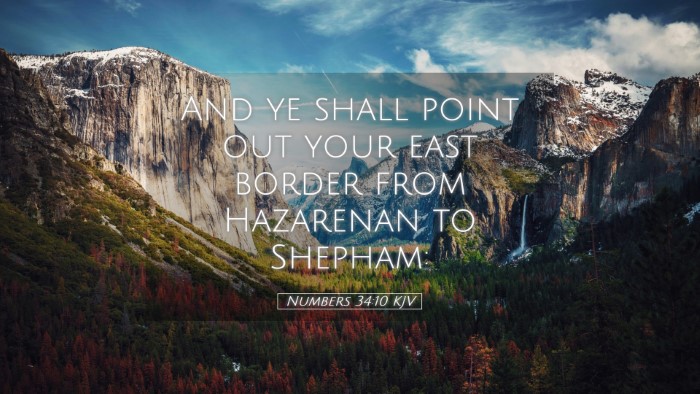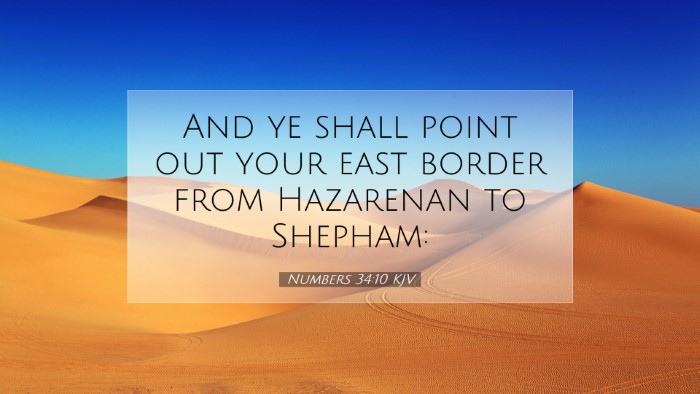Commentary on Numbers 34:10
Numbers 34:10 states:
"And ye shall point out your east border from Hazarenann to Shepham:"
This verse serves as part of the broader context in which the boundaries of the land of Canaan are being delineated for the Israelites. The significance of this passage is profound, as it establishes geographical demarcations that provide insight into God’s covenant with His people.
Historical Context
The Book of Numbers outlines the wilderness wanderings of the Israelites and their transition into the Promised Land. In chapter 34, God instructs Moses concerning the divisions of the land among the tribes of Israel. This necessity for boundaries reflects both a sense of order and the importance of each tribe's inheritance.
Commentary Insights
Matthew Henry’s Commentary
Matthew Henry emphasizes the providential care of God in specifying the borders for the land. He notes:
- Precision in Description: The detailed descriptions indicate God’s intention for His people to have a well-defined territory, which ensures their stability and identity.
- Symbol of Inheritance: The land is viewed as a divinely appointed inheritance, instituted by God, symbolizing a spiritual legacy for the people of Israel.
- Implication for Unity: By granting specific borders, God aims to prevent disputes among the tribes, fostering unity and peace.
Albert Barnes’ Commentary
Albert Barnes provides a thorough examination of the boundaries set in this verse, highlighting:
- Strategic Locations: The mention of Hazarenann and Shepham suggests strategic and significant locations that mark the eastern frontiers of Israel, ensuring both protection and a clear demarcation from neighboring lands.
- God’s Sovereignty: Barnes points out that this allocation not only showcases God's sovereignty but also His faithfulness in fulfilling the promises made to Abraham, Isaac, and Jacob regarding their descendants inheriting the land.
- Responsibilities of the People: This command also implies a responsibility for the Israelites to uphold the covenant by adhering to the boundaries set by God.
Adam Clarke’s Commentary
Adam Clarke adds further depth with his reflections, suggesting that:
- Cultural Practices: The practice of defining borders resonates with ancient Near Eastern customs, providing legitimacy to the Israelites' claim to the land.
- Metaphorical Implications: Clarke also discusses the metaphorical implications of boundaries, indicating that they not only imply physical territory but also embody spiritual boundaries that God establishes for His people.
- Encouragement for Obedience: The emphasis on defining borders encourages the people to remain obedient to God’s laws within the land they inhabit, reminding them that they are stewards of His creation.
Theological Reflections
When reflecting on Numbers 34:10, several theological themes emerge that hold significance for pastors, students, and scholars alike:
- Divine Stewardship: The act of boundary-setting resembles God's role as a steward of creation. The land is not merely a possession but a sacred trust from God, highlighting the spiritual fullness of inheritance.
- Identity and Community: The clear definition of boundaries fosters a sense of identity among the tribes, which is essential for communal life. Unity arises from a shared understanding of belonging and responsibility.
- Obedience and Faithfulness: Establishing borders is both a command and an expectation, encouraging the Israelites to live in accordance with God’s will, reflecting their faithfulness to His covenant.
Conclusion
Numbers 34:10, while seemingly a straightforward boundary description, encapsulates deep theological truths and practical implications for faith life. By recognizing God’s sovereignty in defining the land, believers can further appreciate the importance of boundaries in their spiritual and communal lives. The insights from prominent biblical commentators such as Matthew Henry, Albert Barnes, and Adam Clarke, collectively illuminate the profound significance embedded in this particular verse of scripture.


